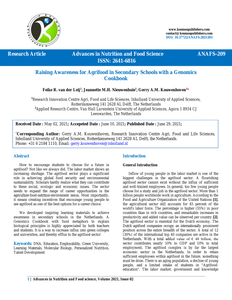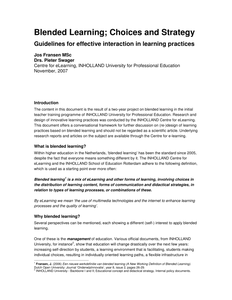The design and use of online materials for blended learning have been in the spotlight of educational development over the last decade. With respect to didactical courses, however, the potential of online and blended learning seems to be underexplored; little is known about its affordances for teacher education, and for domain specific didactical courses in particular. To investigate this potential, as well as the ways to organize the co-design of such learning units, we carried out a small and short-term research project in which teacher educators in the Netherlands engaged in a co-design process of developing and field-testing open online learning units for mathematics and science didactics. We focused on the features of the designed online learning units, on the organization of the co-design process, and on the experiences with the learning units in teacher education practice. A first conclusion was that it was most fruitful to design building blocks rather than ready-to-use courses, and that students should have play a role in the materials. With respect to the co-design process, intensive meetings of small design teams seemed an efficient approach. The experiences in the field tests revealed that the learning units were inspiring, but needed finalization, and educators needed time to prepare the incorporation in their existing educational practices. In the future, the resulting learning units will be maintained and extended, and are expected to contribute to a community of practice of mathematics and science educators.
DOCUMENT
Als relatief nieuw begrip in de context van e-learning krijgt ‘mobile learning’ steeds meer aandacht, wat ten dele kan worden verklaard door de ontwikkeling en verspreiding van mobiele technologie. Als we de pleitbezorgers van ‘mobile learning’ moeten geloven, dan wordt deze vorm van leren belangrijker en is het denkbaar dat sommige leerprocessen in de toekomst volledig op die wijze vormgegeven zullen worden. Probleem is dat een eenduidige definitie van ‘mobile learning’ nog altijd ontbreekt, dat er meningsverschillen zijn over de technologie die tot het domein van ‘mobile learning’ behoort, en dat er betrekkelijk weinig resultaten zijn van succesvolle inzet van mobiele technologie in leerprocessen. Daarbij wordt onder succesvol verstaan dat het heeft bijgedragen aan de effectiviteit van het leren, en daarmee aan een beter leerresultaat en een efficiënter leerproces, waarbij onder het laatste verstaan wordt dat het maximale leereffect wordt bereikt met een beperkte inzet van mensen en middelen. Deze notitie beoogt enige duidelijkheid te scheppen in de definitiekwestie en in de visies op leren die een rol spelen bij ‘mobile learning’. Vanuit dat perspectief wordt vervolgens ingegaan op kenmerken van mobiele technologie en ontwikkelingen die daarin verwacht worden. Aansluitend wordt er dieper ingegaan op leerprocessen en de rol die mobiele technologie daarin zou kunnen vervullen, waarna de notitie wordt afgesloten met een kijkkader om de mogelijke inzet en betekenis van ‘mobile learning’ in onderwijssituaties te kunnen duiden en beoordelen.
DOCUMENT

From the article: "The educational domain is momentarily witnessing the emergence of learning analytics – a form of data analytics within educational institutes. Implementation of learning analytics tools, however, is not a trivial process. This research-in-progress focuses on the experimental implementation of a learning analytics tool in the virtual learning environment and educational processes of a case organization – a major Dutch university of applied sciences. The experiment is performed in two phases: the first phase led to insights in the dynamics associated with implementing such tool in a practical setting. The second – yet to be conducted – phase will provide insights in the use of pedagogical interventions based on learning analytics. In the first phase, several technical issues emerged, as well as the need to include more data (sources) in order to get a more complete picture of actual learning behavior. Moreover, self-selection bias is identified as a potential threat to future learning analytics endeavors when data collection and analysis requires learners to opt in."
DOCUMENT

Learning objects are bits of learning content. They may be reused 'as is' (simple reuse) or first be adapted to a learner's particular needs (flexible reuse). Reuse matters because it lowers the development costs of learning objects, flexible reuse matters because it allows one to address learners' needs in an affordable way. Flexible reuse is particularly important in the knowledge economy, where learners not only have very spefic demands but often also need to pay for their own further education. The technical problems to simple and flexible are rapidly being resolved in various learning technology standardisation bodies. This may suggest that a learning object economy, in which learning objects are freely exchanged, updated and adapted, is about to emerge. Such a belief, however, ignores the significant psychological, social and organizational barriers to reuse that still abound. An inventory of these problems is made and possible ways to overcome them are discussed.
DOCUMENT

Evaluation of the effect of Problem Based Learning course
DOCUMENT

Uit het vooronderzoekvan het project Duurzamelearning communities: Oogstenin de Greenportblijkt dat12 factorenhierbijvan belangrijk zijn. Deze succesfactoren staan centraal in de interactieve tool Seeds of Innovation. Ook komen uit het vooronderzoek, aangevuld met inzichten uit de literatuur en tips om de samenwerking door te ontwikkelen en meer gebruik te maken van de opbrengsten 12 succesfactoren met toelichting, belangrijkste bevindingen en tips voor ‘hoe nu verder’, Poster, Walk through, De app die learning communities helptde samenwerkingnaareenhogerplan te tillenen innovatieveopbrengstenoptimaalte benutten.
MULTIFILE

Learning theories broadly characterised as constructivist, agree on the importance to learning of the environment, but differ on what exactly it is that constitutes this importance. Accordingly, they also differ on the educational consequences to be drawn from the theoretical perspective. Cognitive constructivism focuses on the active role of the learner, and on real-life learning. Social-learning theories, comprising the socio-historical, socio-cultural theories as well as the situated-learning and community-of-practice approaches, emphasise learning as being a process within and a product of the social context. Critical-learning theory stresses that this social context is a man-made construction, which should be approached critically and transformed in order to create a better world. We propose to view these different approaches as contributions to our understanding of the learning-environment relationship, and their educational impact as questions to be addressed to educational contexts.
DOCUMENT
The workforce in the EU is ageing, and this requires investment in older workers so that the organisations in which they work remain competitive and viable. One such investment takes the form of organising and facilitating intergenerational learning: learning between and among generations that can lead to lifelong learning, innovation and organisational development. However, successfully implementing intergenerational learning is complex and depends on various factors at different levels within the organisation. This multidisciplinary literature review encompasses work from the fields of cognitive psychology, occupational health, educational science, human resource development and organisational science and results in a framework that organisations can use to understand how they can create the conditions needed to ensure that the potential of their ageing workforce is tapped effectively and efficiently. Although not a comprehensive review, this chapter serves as a basis for further empirical research and gives practitioners an insight into solving a growing problem.
DOCUMENT

How to encourage students to choose for a future in agrifood? Not like we always did. The labor market shows an increasing shortage. The agrifood sector plays a significant role in achieving global food security and environmental sustainability. Scholars hardly realize what they can contribute to these social, ecologic and economic issues. The sector needs to expand the range of career opportunities in the agriculture-food-nutrition-environment nexus. Most importantly, it means creating incentives that encourage young people to see agrifood as one of the best options for a career choice. We developed inspiring learning materials to achieve awareness in secondary schools in the Netherlands. A Genomics Cookbook with food metaphors to explain biological principles is highly appreciated by both teachers and students. It is a way to increase influx into green colleges and universities, and thereby efflux to the agrifood sector.
MULTIFILE

The content in this document is the result of a two-year project on blended learning in the initial teacher training programme of INHOLLAND University for Professional Education. Research and design of innovative learning practices was conducted by the INHOLLAND Centre for eLearning. This document offers a conversational framework for further discussion on (re-)design of learning practices based on blended learning and should not be regarded as a scientific article. Underlying research reports and articles on the subject are available through the Centre for e-learning.
DOCUMENT
